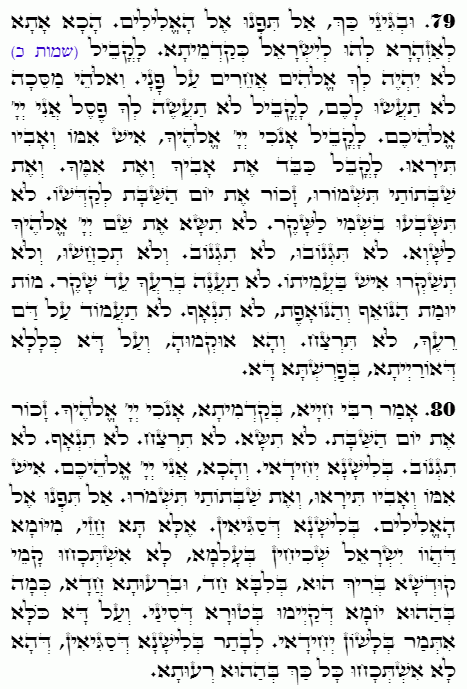Daily Zohar # 4546 – Kedoshim – Singular vs plural
Daily Zohar 4546

Hebrew translation:
80. אָמַר רַבִּי חִיָּיא, בָּרִאשׁוֹנָה – אָנֹכִי ה’ אֱלֹהֶיךָ. זָכוֹר אֶת יוֹם הַשַּׁבָּת. לֹא תִשָּׂא. לֹא תִרְצַח. לֹא תִנְאָף. לֹא תִגְנֹב. בִּלְשׁוֹן יָחִיד. וְכָאן – אֲנִי ה’ אֱלֹהֵיכֶם. אִישׁ אִמּוֹ וְאָבִיו תִּירָאוּ, וְאֶת שַׁבְּתֹתַי תִּשְׁמֹרוּ. אַל תִּפְנוּ אֶל הָאֱלִילִים. בִּלְשׁוֹן רַבִּים. אֶלָּא בֹּא רְאֵה, מִיּוֹם שֶׁהָיוּ יִשְׂרָאֵל מְצוּיִים בָּעוֹלָם, לֹא נִמְצְאוּ לִפְנֵי הַקָּדוֹשׁ בָּרוּךְ הוּא בְּלֵב אֶחָד וּבְרָצוֹן אֶחָד כְּמוֹ בְאוֹתוֹ יוֹם שֶׁעָמְדוּ בְּהַר סִינַי, וְעַל כֵּן הַכֹּל נֶאֱמַר בִּלְשׁוֹן יָחִיד. אַחַר בִּלְשׁוֹן רַבִּים, שֶׁהֲרֵי לֹא נִמְצְאוּ כָּל כָּךְ בְּאוֹתוֹ הָרָצוֹן.
.
Zohar Kedoshim
Continued from previous DZ
#79
And for this reason, “do not turn to idols,” as it is written,
Leviticus 19:3,4
“אִישׁ אִמּוֹ וְאָבִיו תִּירָאוּ וְאֶת שַׁבְּתֹתַי תִּשְׁמֹרוּ אֲנִי יְהוָה אֱלֹהֵיכֶם”
“אַל תִּפְנוּ אֶל הָאֱלִילִים וֵאלֹהֵי מַסֵּכָה לֹא תַעֲשׂוּ לָכֶם אֲנִי יְהוָה אֱלֹהֵיכֶם”
“‘Every one of you shall revere his mother and father, and keep My Sabbaths: I am YHVH your God.” “‘Do not turn to idols, nor make for yourselves molded gods: I am YHVH your God.”
Here, it comes to warn Israel initially, as in the Ten Commandments,
Exodus 20:2
“אָנֹכִי יְהוָה אֱלֹהֶיךָ אֲשֶׁר הוֹצֵאתִיךָ מֵאֶרֶץ מִצְרַיִם מִבֵּית עֲבָדִים לֹא יִהְיֶה לְךָ אֱלֹהִים אֲחֵרִים עַל פָּנָי”
“I am YHVH, your God, who brought you out of the land of Egypt, out of the house of bondage. You shall have no other gods before Me.”
“you shall revere his mother and his father” corresponds to;
Exodus 20:11
“כַּבֵּד אֶת אָבִיךָ וְאֶת אִמֶּךָ לְמַעַן יַאֲרִכוּן יָמֶיךָ עַל הָאֲדָמָה אֲשֶׁר יְהוָה אֱלֹהֶיךָ נֹתֵן לָךְ”
“Honor your father and your mother, that your days may be long upon the land which YHVH your God is giving you.”
And ‘keep my Sabbaths,’ corresponds to;
Exodus 20:7
“זָכוֹר אֶת יוֹם הַשַּׁבָּת לְקַדְּשׁוֹ”
“Remember the Sabbath day, to keep it holy.”
Leviticus 19:12
“וְלֹא תִשָּׁבְעוּ בִשְׁמִי לַשָּׁקֶר וְחִלַּלְתָּ אֶת שֵׁם אֱלֹהֶיךָ אֲנִי יְהוָה”
“And you shall not swear by My name falsely, nor shall you profane the name of your God: I am YHVH.”
This verse corresponds to;
Deuteronomy 5:10
“לֹא תִשָּׂא אֶת שֵׁם יְהוָה אֱלֹהֶיךָ לַשָּׁוְא כִּי לֹא יְנַקֶּה יְהוָה אֵת אֲשֶׁר יִשָּׂא אֶת שְׁמוֹ לַשָּׁוְא”
“‘You shall not take the name of YHVH your God in vain, for YHVH will not hold him guiltless who takes His name in vain.”
Leviticus 19:11
“לֹא תִּגְנֹבוּ וְלֹא תְכַחֲשׁוּ וְלֹא תְשַׁקְּרוּ אִישׁ בַּעֲמִיתוֹ”
“You shall not steal, nor deal falsely, nor lie to one another.”
This corresponds to the commandment of “לֹא תִגְנֹב” “you shall not steal,” and “do not lie to one another” corresponds to “לֹא תַעֲנֶה בְרֵעֲךָ עֵד שָׁקֶר” “You shall not bear false witness against your neighbor.” (Exodus 20:12)
Leviticus 20:10
“וְאִישׁ אֲשֶׁר יִנְאַף אֶת אֵשֶׁת אִישׁ אֲשֶׁר יִנְאַף אֶת אֵשֶׁת רֵעֵהוּ מוֹת יוּמַת הַנֹּאֵף וְהַנֹּאָפֶת”
“‘The man who commits adultery with another man’s wife, he who commits adultery with his neighbor’s wife, the adulterer, and the adulteress, shall surely be put to death.”
This corresponds to the commandment of “לֹא תִנְאָף” “You shall not commit adultery.” (Exodus 20:12)
Leviticus 19:16 “לֹא תַעֲמֹד עַל דַּם רֵעֶךָ” corresponds to “לֹא תִרְצַח” “You shall not murder.”
For these reasons the entire Torah is summarized in this parasha.
#80
Rabbi Chiya said, initially in the Ten Commandments, it is written, “I am YHVH your God,” “Remember the Sabbath day,” “You shall not take,” “You shall not murder,” “You shall not commit adultery,” “You shall not steal,” in the singular form. And here, it is written, “I am YHVH your God,” “Every one of you shall revere his mother and his father,” “Keep my Sabbaths,” and “Do not turn to idols,” in the plural form. And he answers, but come and see, from the day Israel was in the world, they were not found before the Holy One, Blessed be He, with one heart and one will, as on that day they stood at Mount Sinai. Therefore, everything was said in the singular. And afterward, it was said in the plural because they were not so united with one will as before.
{||}

 Previous: Kedoshim
Previous: Kedoshim

